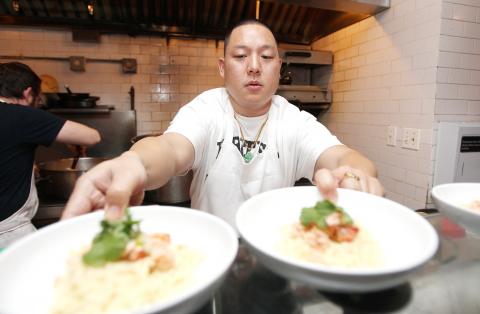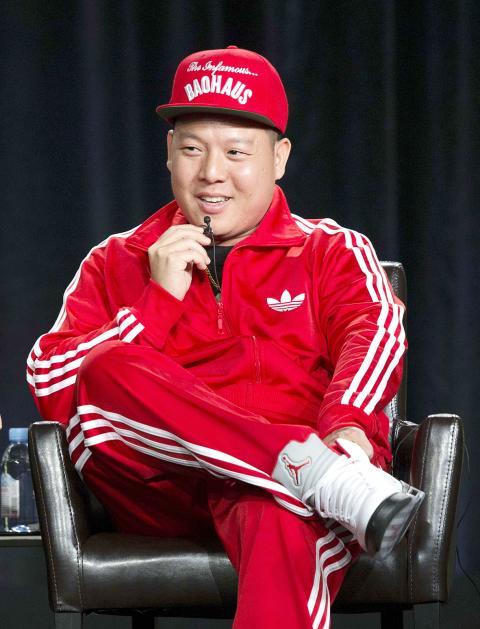A few years ago, after Eddie Huang submitted the manuscript of his memoir Fresh Off the Boat, which made ample use of footnotes, his editor, Chris Jackson, asked him if he’d read fellow footnoter Junot Diaz. He had not.
“I have real gaps in my literary history,” Huang said recently, with his signature blend of self-deprecation and upstart bravado. “Number 1, I’m Chinese, and Number 2, I’m from Orlando. So help me, fam!”
He began Diaz’s The Brief Wondrous Life of Oscar Wao, but stopped after 100 pages, wowed and flummoxed: “I didn’t want to steal his moves.” He didn’t return to it until he had completed the first draft of his new memoir, Double Cup Love: On the Trail of Family, Food, and Broken Hearts in China (Spiegel & Grau), which was released on Tuesday.

Photo: AP
“I was chasing him through the last eight revisions, asking myself, ‘Does this give you feelings on that level that Oscar Wao gave you?’ ” Huang said. “I got as close as I could.”
It was coming up on midnight in New York when he said this, and he was wearing a jubilantly loud J.W. Anderson coat with fat horizontal stripes in varying shades of brown. It was cold out, and a few feet away was the Gilded Lily, the club where he was about to host a party with the fashion designer Maxwell Osborne, of the au courant duo Public School.
But before that, one last point. “People always want to compare me to Tony,” Huang added, referring to Anthony Bourdain, the modern prototype of chef turned acidic social commentator. “But I never read Kitchen Confidential. I read Oscar Wao.”

Photo: REUTERS
FOOD TO FAME
Food is, as ever, a Trojan horse for Huang, who in the past five years has parlayed fame (and a little bit of infamy) as a chef into a career of pining, bomb-tossing and taunting — sometimes good-naturedly, sometimes bad-naturedly, sometimes both.
In addition to his two memoirs (his first was turned into an ABC sitcom), he’s given a memorable TED talk (then had his TED fellowship rescinded over disagreements with the foundation); written the occasional scathing takedown article; been featured in a Sprite commercial; and hosted an Internet show about global food culture, which has morphed into the television show Huang’s World, on Viceland.
Throughout, hip-hop has been his framework and organizing narrative. On the difference between his first memoir and the new one: “Fresh Off the Boat is a mixtape — the Cam’ron mixtape before Purple Haze; Double Cup Love is the album. I smoothed things out, I mixed it, I was surgical about it.”
In Double Cup Love, Huang, 34, who was born in Falls Church, Virginia, near Washington, to Taiwanese immigrants, and raised in Orlando, Florida, details his parallel quests for acceptance: by China, and by a woman he fell for and eventually proposed to. “I don’t think I was ever able to be as close with someone as I was with her, and I don’t think I was ever as able to be comfortable with being Chinese as I was with Chengdu,” he said.
Exclusion is a continuing theme of Huang’s work, and he often finds himself at odds, he said, with Asian-Americans who feel his story isn’t appropriately representative. “A lot of people are trying to actively contain my voice, like, ‘He doesn’t speak for us,’ and I’m like, ‘I won’t argue with you.’” Often, he said, he speaks at colleges where the main question he’s asked is, in essence, “How did you learn to love yourself?”
Huang’s writing is wry and zippy; he regards the world with an understanding of its absurdities and injustices and with a willingness to be surprised. The dark edge of Fresh Off the Boat is mostly gone in the new book, replaced with an acceptance of calm in his life.
AGAINST THE GRAIN
Double Cup Love was originally proposed as a book in which Huang would travel to China to try cooking for locals, but it turned into a memoir about love. Neither of his books is really about food — “it’s all window dressing,” he said.
He added: “When you live in a place where you are not the dominant culture, you have to play fools against themselves. You’re going to assume I can kung fu, you’re going to assume I can cook food, and I’m going to play this against you.”
Still, even if food is only the costume, it occupies a central role in Huang’s life. Before the party at the Gilded Lily, Huang had begun his evening cooking a private dinner for a music lawyer and some associates, including Florence Welch (of Florence and the Machine) and the songwriter-producer Emile Haynie. After that, it was on to Sushi Yasuda in Midtown, for a seat at the counter and some fawning over the omakase, with running commentary after he popped each piece into his mouth with his hands.
Huang began writing during high school as a reaction to hearing other students disparage hip-hop. It was “a call to arms,” he said. “I decided I’ll write about anything unfair.”
Righting injustices remains a crux of his work: He devoted much of a recent “Huang’s World” episode about Jamaica to the “new colonialism” caused by that nation’s crippling debt, and said that he hoped to go to Kenya to learn more about one organization’s attempt to support a universal baseline income — a policy he described as “reparations for those who don’t fit in.”
Even though Huang has rabbis who’ve smoothed his path toward the mainstream — his editor, Jackson; Shane Smith of Vice; Michael Lombardo, HBO’s president of programming, who is stepping down — the defining throughline of his public life has, until now, been a tug of war with authority.
But lately he’s been wondering if his bomb-throwing days are coming to an end. “I’m not as much of an outsider now,” he conceded. “People can make money off of me — I’m a proven commodity.”

The canonical shot of an East Asian city is a night skyline studded with towering apartment and office buildings, bright with neon and plastic signage, a landscape of energy and modernity. Another classic image is the same city seen from above, in which identical apartment towers march across the city, spilling out over nearby geography, like stylized soldiers colonizing new territory in a board game. Densely populated dynamic conurbations of money, technological innovation and convenience, it is hard to see the cities of East Asia as what they truly are: necropolises. Why is this? The East Asian development model, with

June 16 to June 22 The following flyer appeared on the streets of Hsinchu on June 12, 1895: “Taipei has already fallen to the Japanese barbarians, who have brought great misery to our land and people. We heard that the Japanese occupiers will tax our gardens, our houses, our bodies, and even our chickens, dogs, cows and pigs. They wear their hair wild, carve their teeth, tattoo their foreheads, wear strange clothes and speak a strange language. How can we be ruled by such people?” Posted by civilian militia leader Wu Tang-hsing (吳湯興), it was a call to arms to retake

This is a deeply unsettling period in Taiwan. Uncertainties are everywhere while everyone waits for a small army of other shoes to drop on nearly every front. During challenging times, interesting political changes can happen, yet all three major political parties are beset with scandals, strife and self-inflicted wounds. As the ruling party, the Democratic Progressive Party (DPP) is held accountable for not only the challenges to the party, but also the nation. Taiwan is geopolitically and economically under threat. Domestically, the administration is under siege by the opposition-controlled legislature and growing discontent with what opponents characterize as arrogant, autocratic

When Lisa, 20, laces into her ultra-high heels for her shift at a strip club in Ukraine’s Kharkiv, she knows that aside from dancing, she will have to comfort traumatized soldiers. Since Russia’s 2022 invasion, exhausted troops are the main clientele of the Flash Dancers club in the center of the northeastern city, just 20 kilometers from Russian forces. For some customers, it provides an “escape” from the war, said Valerya Zavatska — a 25-year-old law graduate who runs the club with her mother, an ex-dancer. But many are not there just for the show. They “want to talk about what hurts,” she